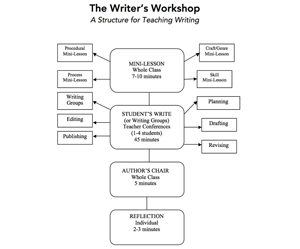Workshop: A physical place where a craftsperson creates something.
Writer: A person who informs, entertains, persuades, remembers, reminds, and expresses using a combination of words.
 What’s the difference between a writing workshop and a writers' workshop? Educators tend to use the two terms interchangeably, but I believe there’s a difference. In a writing workshop the focus is on the writing. Teachers hone in on what’s present on the page, what’s missing, and how the writing needs to change to meet a set of standards. In a writers' workshop, the focus is on the writer. Teachers focus on the person crafting the text—helping writers choose topics, purposes, and audiences for their writing and offering suggestions to guide the writer's decision-making process. A writing workshop provides a physical space for writers to work, while a writers' workshop provides both a physical and psychological space for writers to grow. I believe we teachers need to work towards building a writers' workshop within our classrooms.
What’s the difference between a writing workshop and a writers' workshop? Educators tend to use the two terms interchangeably, but I believe there’s a difference. In a writing workshop the focus is on the writing. Teachers hone in on what’s present on the page, what’s missing, and how the writing needs to change to meet a set of standards. In a writers' workshop, the focus is on the writer. Teachers focus on the person crafting the text—helping writers choose topics, purposes, and audiences for their writing and offering suggestions to guide the writer's decision-making process. A writing workshop provides a physical space for writers to work, while a writers' workshop provides both a physical and psychological space for writers to grow. I believe we teachers need to work towards building a writers' workshop within our classrooms.
In the past two decades, as laws have ushered in more standardized assessments, our writing classrooms have started to reflect a trend towards sameness. A simple stroll down many school hallways reveals this. Student writing, posted side-by-side, often follows the same five paragraph structure—stories that all begin with dialogue leads, or persuasive pieces that have the same exact transitional words threaded throughout the text. One piece sounds exactly like the next—each one as voiceless as the one before. It seems to me that we have started to embrace compliance rather than honoring the uniqueness of the stories our children might tell.
I think we’d be wise to consider our reading lives as we determine what’s important when helping writers develop their writing lives. As a reader, I seek texts that are thought-provoking, emotional, meaningful, interesting, unpredictable, moving, honest, funny, and powerful. Over the past two months I’ve read high fantasy (A Clash of Kings by George R.R. Martin), humor (Best State Ever by Dave Barry), memoir (Just Kids by Patti Smith), historical nonfiction (Killers of the Flower Moon by David Grann), and YA fiction (The Hate U Give by Angie Thomas). Each book informed me, made me laugh, provoked thought, appealed to my emotions. And each author kept me turning pages. If we value these qualities above all others as readers, shouldn’t we work to hone these qualities within our young writers?
As writing teachers, how often do we begin lessons asking:
- What kind of (story, informational text, persuasive essay, poem, digital text) do you want to explore?
- What tone (humorous, sad, thought-provoking, ethereal) do you want to convey?
- How do you want your audience to react?
- What do you need to know how to do as a writer to achieve those results?
In a writers' workshop we work to foster the habits young writers need to form so writing is a routine. And through this daily routine, we work to help writers obtain the cumulative knowledge they need to continuously develop and hone their craft. The focus is entirely on the writer. We help writers develop the skills that will sustain them across multiple pieces of writing.
Here are some of my tips for creating a more writer-focused writers' workshop:
- Know your students: Spend the first several weeks of school engaging in conversations with students about their lives outside the classroom. Use these conversations to match them to writing topics throughout the year.
- Delay genre studies: Resist going into genre studies too early in the school year. Give students the first 6–8 weeks to explore genres on their own. As you learn about your students’ lives, you’ll also learn about their preferred genres.
- Confer: Confer with students for a week before planning an entire genre study. Our mini-lessons should be responsive to what our students create as writers. We don’t know what to teach until we’ve had a chance to study our writers
- Offer an author’s chair: Give children opportunities to share their writing with the class and ask them to direct feedback from their peers.
- Leave time for reflection: Ask students to reflect daily on their learning. Reserve some time (2–3 minutes) at the end of your workshop and ask students to name something they learned. Their replies give you a snippet of authentic assessment that you can use when planning lessons.
I’ve taught writing in some capacity for over 20 years now—from teaching our youngest writers in pre-K to working with adult writers at the college level. When I first started teaching writing, I followed a guide handed to me by the district—I was teaching writing, but I wasn’t teaching writers. Now, I know better. I follow the writer. And my instruction is much more meaningful because I allow them to lead the way.

Dr. Brian Kissel is an associate professor of literacy at the University of North Carolina at Charlotte. A former elementary school teacher and literacy coach, Brian teaches courses, conducts research, and provides professional development in writing instruction. He has a new book, published by Stenhouse, titled When Writers Drive the Workshop: Honoring Young Voices and Bold Choices. You can follow Dr. Kissel on Twitter.